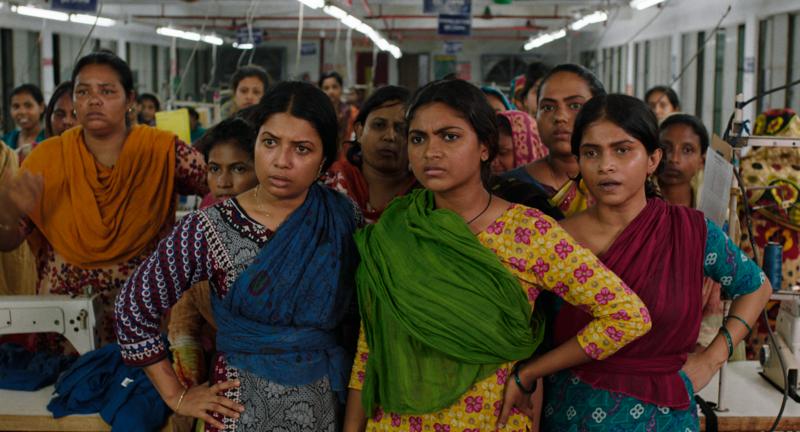
In 'Made in Bangladesh', Bangladeshi director Rubaiyat Hossain tells the story of Shimu, a young factory worker in Dhaka, who joins the workers' union after the death of a co-worker in an accident. The film, a French-Bangladeshi-Danish-Portuguese co-production, is enjoying its world premiere in the Contemporary World Cinema section at Toronto Film Festival (5-15 September).
'Made in Bangladesh' is Rubaiyat Hossain's third feature after 'Meherjaan' from 2011 and 'Under Contruction' from 2015, both of which have won several awards worldwide. She participated with the script for 'Made in Bangladesh' at the co-production platform Locarno Open Doors Hub in 2017, where she received the Arte award.
Peter Hyldahl co-produces for Denmark's Beofilm, and more key Danish credits include Jacques Pedersen on sound and sound design, Tin Soheili as composer and Beo Post on post-production.
"The story is universally relevant," says Peter Hyldahl. "I like that it doesn't just show how terrible the workers' lives are, but has positive elements and tells a story about a strong woman in a difficult world."
"We've had a strong team, including Danish creatives who have made their mark on the creative process. This is Rubiyat's third feature, but her first European production. It's been great to help her push her career to the next level, and that we managed to get it into an A-festival. That opens doors in the long run."
We discussed the film with Hossain when she was in Copenhagen for post in December.
What inspired the story?
"My previous film, 'Under Construction', was about a woman from the urban middle class, so this time I wanted to explore the life of a woman who was a worker. When I started doing research, I met Daliya who really inspired me. She was a union president who got laid off when she was eight months pregnant. I was fascinated by her strength and the dignity she had gotten from having the position as union president, where she would negotiate with the boss of the factory who had to sit and talk to her eye to eye.
"Since Sheikh Hasina became Prime Minister of Bangladesh in 2009, there's been a new level of women's empowerment, and a new generation of women in their 20s have been inspired to work and make money from seeing more women in positions of power. Daliya was only 23 when I met her, and she was fearless."
Have the unions brought better conditions for the factory workers?
"Yes. There was a big collapse of the Rana Plaza factory in Dhaka in 2013, where more than 1,100 workers died, and that created a lot of changes and global attention. The government shut down factories that were in bad conditions, and non-profits are coming in to help unionizing. Right now, the conditions have improved, but the workers want higher wages. I'm not an expert on the topic, so I stay true to Daliya's story. And she's still struggling."
Your debut film 'Meherjaan' from 2011 was banned in Bangladesh. What happened?
"The story is a commentary on how nationalism is a masculine concept and creates conditions for violence and war. I was trying to show war from a feminine point of view and had the main character fall in love with a Pakistani enemy soldier during the 1971 war. The censor board took that as unpatriotic and banned it, and the film became very controversial.
"'Under Construction' got through censorship without any cuts and was well-received, so I have more acceptability now. But I have to be very careful, and that's why I want to work more internationally. I'm just a storyteller and a filmmaker. I'm not trying to be an activist."
What did you get out of the Danish collaboration?
"I usually have issues working with men, but I have very good collaborations with Jacques (Pedersen, ed.) and Tin (Soheili, ed.) in Denmark. The culture here is sensitive to gender equality, and they don't treat me differently.
"Before, I worked in Bombay, and while the quality of filmmaking is good, the style is completely different from what I want. They want to make everything bright and glossy and don't really listen to a young woman director from Bangladesh. I'm so happy that for the first time, I get to do what I wanted to do in sound. We've used all location sound that Jacques has cleaned up really well. I wanted to make the film really atmospheric and make you feel the place with the color and sounds."
What do you hope audiences take away from the film?
"I hope audiences pick up a sense of hope and accomplishment. The fight goes on, but I wanted to celebrate the protagonist's victory in this moment. Women aren't victims anymore, they're agents of change. That's what this movie is about for me."


